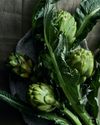
When Fofi Gourlas was a teenager, her parents gave her a nickname: hortofaga, or “weed-eater”. It was a gently jibing, affectionate term. In Greek, the word refers to the idea of a certain bovine-slowness at the dinner table, as well as a love of eating greens.
Growing up in suburban Sydney in the 1970s, Gourlas has happy memories of weekend expeditions to the Blue Mountains to forage for wild dandelions with her mother. Less pleasant are the memories of her classmates’ horrified reactions when they clocked what was in her lunchbox – which was invariably fragrant with the typical Greek flavours of garlic, oregano and parsley.
“As soon as I unwrapped it, it just reeked,” she says. “I always felt really embarrassed.” She soon convinced her mother to pack her a more socially acceptable lunch: Vegemite sandwiches, made with white bread.
But within the Greek community, things were different. When her parents arrived in Australia in the late 1950s, they brought their food traditions with them – a diet rich in vegetables, in legumes, in the dark leafy greens that Gourlas loved so much. Fish was eaten once or twice a week, red meat more rarely. Every Saturday, she would go with her father to the markets and come home with vegetables by the box: artichokes, green beans, tomatoes. Her mother would make prasorizo – a risotto-like dish sweet with caramelised leeks and aromatic with dill and parsley – hulking pastitsio and pies filled with salty feta and foraged greens. When Gourlas went vegetarian at 16, her mother’s cooking barely had to change.
This story is from the {{IssueName}} edition of {{MagazineName}}.
Start your 7-day Magzter GOLD free trial to access thousands of curated premium stories, and 9,000+ magazines and newspapers.
Already a subscriber ? Sign In
This story is from the {{IssueName}} edition of {{MagazineName}}.
Start your 7-day Magzter GOLD free trial to access thousands of curated premium stories, and 9,000+ magazines and newspapers.
Already a subscriber? Sign In

From personal experience
Former Hope St Radio chef ELLIE BOUHADANA invites you to gather your loved ones and enjoy an evening of good food and laughter with recipes from her new cookbook, Ellie's Table.

Kimberley Moulton
Kylie Kwong celebrates the individuals helping to grow a stronger community. This month, we applaud the international curator and Yorta Yorta woman who is shining a light on First Peoples.

Tom Wallace
We share a drop with the head winemaker for Devil's Corner, Tamar Ridge and Pirie Sparkling, a master of cool-climate grapes.

Best in class
The top drops to keep an eye out for on wine lists (and why they're worth the splurge)

A taste of refuge
Fleeing war and persecution, Australia's new arrivals push our food culture forward. DANI VALENT explores the contributions of the country's refugee communities.

BE OUR GUEST
Inspired by the sense of place conjured by Europe's Michelin-star restaurants, local restaurateurs are expanding their hospitality remit to include accommodation

Barcelona BUZZ
A popular drawcard for digital nomads and expats alike, the Catalonian capital offers equal parts sophistication and fun. Here, DANI VALENT discovers the latest dining hotspots.

HEATHCOTE BOUND
MICHAEL HARDEN hits the road to explore regional Victoria's Heathcote, home to this year's Best Destination Dining and a host of other delights.

The art of...relishing restaurants
Does working in hospitality make someone a better or worse diner

HEART AND SOUL
Not a vegetable but rather a flower bud that rises on a thistle, the artichoke is a complex delight. Its rewards are hard won; first you must get past the armour of petals and remove the hairy choke. Those who step up are rewarded with sweet and savoury creaminess and the elusive flavour of spring. Many of the recipes here begin with the same Provençal braise. Others call on the nuttiness of artichokes in their raw form. The results make pasta lighter and chicken brighter or can be fried to become a vessel for bold flavours all of which capture the levity of the season.